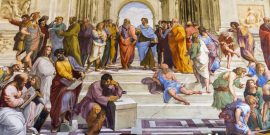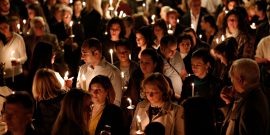Roosevelt Montás beautifully explains how the study of the liberal arts can make us more human.
Nathaniel Peters
Our core problem is not one of liberalism or expressive individualism, but how we conceive of ourselves and our happiness.
The goal of Catholic social teaching should be clear understanding rooted in theology, not just a call to action.
Trueman deftly traces the sources of the inward, emotive, and poetic self in the modern Western social imaginary.
The rise of secularism concealed the medieval theological foundations of international order, but did not destroy them.
By what standards do we distinguish real growth from regression, real freedom from veiled enslavement?
We’ve come to fear not chaos and disaster at the hands of our leaders, but simply failure and sclerosis.
A play that captures the struggle for the conservative heart in the Trump era, and explains it to New Yorkers.
Greg Lukianoff and Jonathan Haidt explore the logic by which college students and profs label the words and ideas of others as violence.
Religious liberty and freedom of conscience exist in the West because Christians developed them from the truths they held.
We go off track when we conceive human rights as representing freedom, and the natural law as representing oppression.
George Weigel on the truths we still ought to hold dear.
He lamented Americans’ lack of moral consensus about the common good. But unlike his critics, Novak would not impose his vision of it from the top down.
Mary Jo Kopechne perished not because Ted Kennedy crashed his car, but because the legacy was more important than telling the authorities she was in it.
Nathaniel Peters is the director of the Morningside Institute.




















